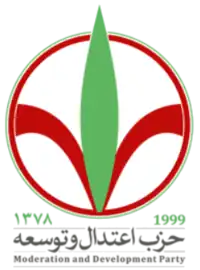Moderation and Development Party | |
|---|---|
 | |
| Leader | Hassan Rouhani[1] |
| Secretary-General | Mohammad Bagher Nobakht[2] |
| Spokesperson | Ramezan-Ali Sobhanifar[3] |
| Executive Secretary | Morteza Bank[4] |
| Politburo Head | Mahmoud Vaezi |
| Election Head | Ali Jannati[5] |
| Founded | 1999[1] |
| Headquarters | Tehran, Iran |
| Ideology | Moderation Pragmatism Islamic democracy Technocracy |
| Political position | Centre[6] |
| Alliance |
|
| Website | |
| https://www.hezbet.ir | |
Moderation and Development Party (Persian: حزب اعتدال و توسعه, romanized: Hezb-e E'tedāl va Towse'eh) is a political party in Iran. It is a pragmatic-centrist political party which held its first congress in 2002.[7]
Platform
The party is part of the faction called "modernist right", "moderate reformists" and "technocrats" that draws from upper-level bureaucrats, industrialists and managers.[8] It deals with a platform on modernization and economic growth rather than social justice, along with the Executives of Construction Party and the Islamic Labour Party.[9] The party has been allied with Popular Coalition of Reforms[6] and Pervasive Coalition of Reformists[10] in parliamentary elections and has had good relations with both Mohammad Khatami’s reform program and Akbar Hashemi Rafsanjani.[2] In April 2017, the party joined the supreme policymaking council of reformists.[11]
Some sources branded them as part of the conservative camp in the 2000s[12][13][14] or reformists under the leadership of Akbar Hashemi Rafsanjani.[15] In 2003, the party's spokesperson wrote in Hamshahri that the party regards itself among "true reformists", who are idealists considering "social realities" interpreted with the "principle of moderation".[16]
According to Ali Afshari, the party prioritizes economic expansion and follows free market policies, however a minority faction represented by members such as Nobakht, advocate institutionalized economy and maintain that the government should interfere to regulate markets to a limited extent.[17] They support limited political and cultural transformations, and believe political activism should only be within the frameworks of the constitution. The party also embraces Velayat Faqih.[17]
Presidential candidates
| Year | Candidate |
|---|---|
| 2001 | Mohammad Khatami |
| 2005 | Akbar Hashemi Rafsanjani[18] |
| 2009 | Mir-Hossein Mousavi[19] |
| 2013 | Hassan Rouhani[1] |
| 2017 | Hassan Rouhani[20] |
Members
Current officeholders
- Cabinet
- Hassan Rouhani, President of Iran
- Mahmoud Vaezi, Chief of Staff
- Mohammad Bagher Nobakht, Vice President for Strategy
- Masoud Soltanifar, Minister of Sports
- Parliament
- Bahram Parsaei (Shiraz)
- Zahra Saei (Tabriz, Osku and Azarshahr)
- Ali Nobakht (Tehran, Rey, Shemiranat and Eslamshahr)
- Ramezanali Sobhanifar (Sabzevar, Joghatai and Joveyn)
- Hadi Bahadori (Urmia)
- Sakineh Almasi (Kangan, Jam, Dayyer and Asaluyeh)
- Rasoul Khezri (Piranshahr and Sardasht)
- Shadmehr Kazemzadeh (Dehloran, Darreshahr and Abdanan)
See also
References
- 1 2 3 Seyed Hossein Mousavian (5 July 2013), "The Rise of the Iranian Moderates", Al-Monitor, archived from the original on 17 November 2019, retrieved 7 December 2016
- 1 2 Khani, Mohamamd Hassan (17 July 2012). "Political Parties in the Islamic Republic of Iran". Iran Review. Retrieved 1 April 2016.
- ↑ ""جنتی" معاون کانونها و "سبحانیفر" سخنگوی اعتدال و توسعه شدند" (in Persian). Tasnim News Agency. 27 June 2017. Retrieved 12 September 2017.
- ↑ "Iran News Round Up", Critical Threats Project, 8 December 2015, retrieved 7 April 2017
- ↑ "Iran's Presidential Election: Who are the Candidates?", Iran Wire, 13 April 2017, retrieved 21 April 2017
- 1 2 "Guide: Iranian parliamentary elections". BBC World. Retrieved March 10, 2015.
- ↑ "Iran Report". Radio Free Europe/Radio Liberty. 16 February 2004. Retrieved 10 March 2017.
- ↑ Rabasa, Angel; Waxman, Matthew; Larson, Eric V.; Marcum, Cheryl Y. (2004). The Muslim World After 9/11. Rand Corporation. p. 221. ISBN 9780833037558.
- ↑ Mohseni, Payam (2016). "Factionalism, Privatization, and the Political economy of regime transformation". In Brumberg, Daniel; Farhi, Farideh (eds.). Power and Change in Iran: Politics of Contention and Conciliation. Indiana Series in Middle East Studies. Indiana University Press. p. 44.
- ↑ Parisa Hafezi (18 February 2016). Dominic Evans (ed.). "Factbox: Parties and politics in Iran's parliamentary election". Reuters. Retrieved 27 February 2017.
- ↑ "Moderation party joins reformist policy-making council", Tehran Times, 10 April 2017, retrieved 14 April 2017
- ↑ Beeman, William O. (Summer 2004). "Elections and Governmental Structure in Iran: Reform Lurks Under the Flaws" (PDF). Brown Journal of World Affairs. XI (1): 55–67.
- ↑ "How Iran votes". BBC World. 3 February 2004. Retrieved 27 March 2017.
- ↑ Kaveh-Cyrus Sanandaji (2009), "The Eighth Majles Elections in the Islamic Republic of Iran: A Division in Conservative Ranks and the Politics of Moderation", Iranian Studies, Routledge, 42 (4): 621–648, doi:10.1080/00210860903106345, S2CID 153397356
- ↑ Aras, Bulent (September 2001). "Transformation of the Iranian political system: Towards a new model?" (PDF). Middle East Review of International Affairs. 5 (3).
- ↑ "In the Gap between the Two Wings", Hamshahri (in Persian), no. 3005, p. Politics, 15 March 2003, retrieved 1 June 2017
- 1 2 Ali Afshari (8 April 2014), "Internal rivalries hinder Rouhani's reform efforts", Al-Monitor, retrieved 11 December 2016
- ↑ "Moderation and Development Party backs Rowhani for president", Mehr News Agency, 14 September 2008, retrieved 24 November 2016
- ↑ "Party leader wants debates among candidates' representatives", Mehr News Agency, 30 May 2009, retrieved 24 November 2016
- ↑ "Moderation and Development Party to back Rouhani", Tehran Times, 14 January 2017, retrieved 14 January 2017